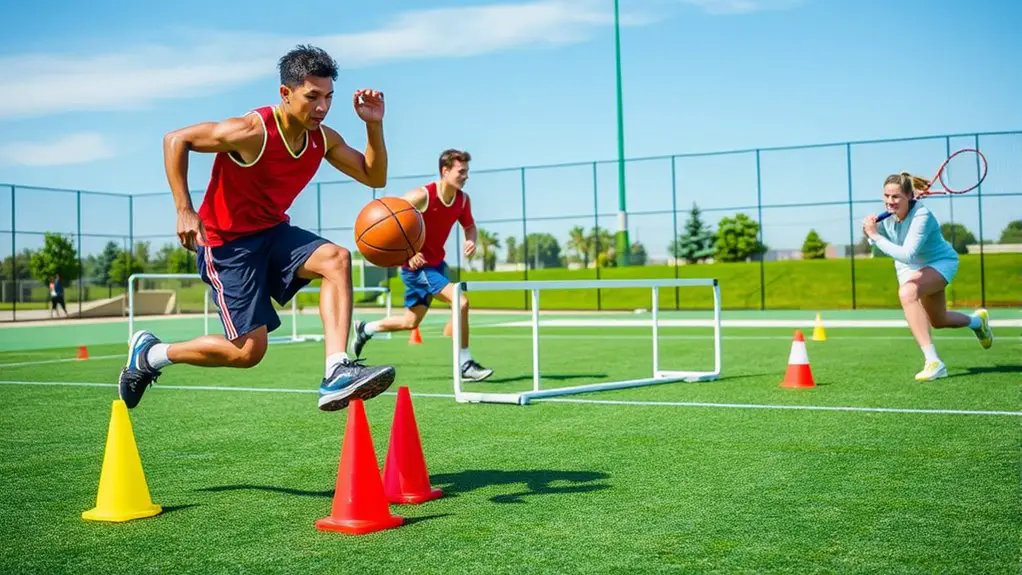Strengthening your core is essential for improving your tackling and blocking skills in football. A strong core enhances your balance, stability, and power, which helps absorb impacts effectively. Incorporate exercises like planks, medicine ball throws, and rotational movements into your routine to build a robust core foundation. By focusing on these workouts, you'll see better control and fluidity in your tackles. Keep going, as there's much more to discover about enhancing your performance on the field.
The Role of Core Strength in Football Performance
While many players focus on legs and arms for power, it's your core strength that truly underpins football performance. Your core is the foundation for movement, providing the necessary core stability to drive your body through tackles and blocks. When you engage your core, you enhance your balance and coordination, allowing for more agile maneuvers on the field.
Moreover, building a strong core is essential for injury prevention. A stable core helps distribute forces more evenly throughout your body, reducing the risk of strains and sprains. You'll find that improved core strength not only boosts your game but also keeps you healthier in the long run. Additionally, strong core muscles aid in enhancing stability during dynamic movements, which is crucial for executing effective tackles and blocks.
Key Benefits of a Strong Core for Tackling
A strong core considerably enhances your tackling ability on the football field. With improved core stability, you'll find it easier to execute tackling techniques effectively, allowing for better balance and control during plays. Here are some key benefits of a strong core:
| Benefit | Description |
|---|---|
| Improved Balance | A stable core helps you stay grounded, enabling you to absorb impacts better. |
| Enhanced Power Output | Strong core muscles generate more force, making your tackles more impactful. |
| Injury Prevention | Stability reduces the risk of injuries, keeping you on the field longer. |
Moreover, a strong core contributes to enhanced performance by allowing for more fluid and powerful movements during tackles.
Essential Exercises for Core Development
To build a strong core that enhances your tackling and blocking skills, incorporating targeted exercises into your training routine is essential. Start with plank variations; they're fantastic for building stability. Try side planks or plank jacks to engage different muscle groups. You'll not only strengthen your core but improve your overall balance, too.
Next, grab a medicine ball. It's versatile and perfect for dynamic movements. Incorporate exercises like medicine ball slams or rotational throws to challenge your core while mimicking real-game scenarios. These explosive movements will boost your power and coordination, giving you an edge on the field.
Lastly, don't forget about dead bugs and Russian twists. They'll help you develop core strength in various planes of motion, vital for effective tackling and blocking. By integrating these exercises, you'll create a robust foundation that supports your performance and helps you feel free and agile during every play. Additionally, engaging in compound movements will further enhance your overall athletic performance and functional strength.
Incorporating Core Training Into Your Routine
Incorporating core training into your routine can considerably enhance your tackling and blocking abilities. To boost your core stability and rotational strength, try these three vital steps:
- Plank Variations: Start with standard planks, then progress to side planks and plank rotations. This builds endurance and strength in your core, essential for maintaining balance during tackles.
- Medicine Ball Throws: Incorporate rotational exercises using a medicine ball. These throws engage your core dynamically and improve your power and agility when making plays.
- Cable Woodchoppers: Using a cable machine, perform woodchopper movements to develop rotational strength. This mimics the twisting motions you'll encounter in games, enhancing your effectiveness on the field.
Integrating these exercises into your training will not only fortify your core but also give you the freedom to maneuver confidently during tackles and blocks. Additionally, core training enhances balance for fluid movement and evasion, which is crucial in high-stakes situations. Embrace the challenge, and watch your skills soar!
Measuring Progress and Enhancing Skills
After building a solid core through targeted exercises, it's important to measure your progress and enhance your skills on the field. Regular skill assessments can help you evaluate your core stability and overall performance. Incorporating proper warm-up techniques can further reduce the risk of injuries while maximizing your training effectiveness.
Use the following table to track your progress effectively:
| Skill Area | Assessment Method |
|---|---|
| Core Stability | Plank duration |
| Tackling Technique | Video analysis |
| Blocking Power | Resistance training scores |
| Overall Performance | Game performance stats |
Frequently Asked Questions
How Does Nutrition Impact Core Strength and Performance?
Think of your body as a finely-tuned race car; without the right fuel, it won't perform its best. Nutrition plays a pivotal role in your core strength and overall performance. By mastering nutrient timing, you guarantee your muscles get the energy they need when they need it. Don't forget hydration's importance, either; staying well-hydrated keeps your body running smoothly. So, fuel up wisely, and watch your performance soar like a bird set free!
Can Yoga Improve Core Strength for Football Players?
Absolutely, yoga can greatly improve core strength for football players. Through various poses and stretches, you'll enhance your core stability, which is essential for performance. The yoga benefits go beyond just physical strength; it also promotes flexibility and balance, allowing you to move freely on the field. By incorporating yoga into your routine, you'll not only build a stronger core but also facilitate better overall body control, helping you excel in your game.
What Are the Signs of a Weak Core?
If you're wondering about the signs of a weak core, you might notice some posture issues, like slouching or difficulty maintaining balance. You could also experience fatigue symptoms during activities that require stability or strength. When your core isn't strong, everyday movements can feel more challenging, limiting your freedom and overall performance. Paying attention to these signs can help you identify when it's time to focus on strengthening your core for better functionality.
How Often Should I Train My Core?
Think of your core like a strong foundation for a house; without it, everything else can crumble. For ideal results, aim for core training frequency of about two to three times a week. This core workout schedule allows your muscles to recover while still promoting strength. Listen to your body—if you feel fatigued, it's okay to take a break. Consistency is key, but freedom in your routine can keep your workouts enjoyable!
Are There Any Age Restrictions for Core Training?
When it comes to core training, there aren't strict age restrictions. It's more about your individual fitness level and goals. Whether you're young or older, core exercises can be beneficial and adapted to fit your needs. Just listen to your body and make sure you're using proper form to avoid injuries. Freedom in training means you can start whenever you're ready, as long as you consider your current abilities and health.




